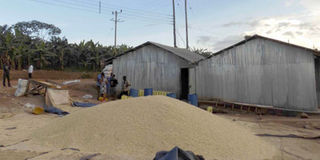Serere farmers team up to kick out ‘exploitative’ middlemen

Pingire produces maize and other cereals in bulk
What you need to know:
- In the past, problems with middlemen were not common because farmers sold their produce under cooperative unions.
- A middleman is a person who buys goods from producers and sells them to retailers or consumers.
Farmers in Pingire Sub-county, Serere District, have come together to market and sell their produce in bulk for bigger profits and ward off middlemen whom they accuse of exploitation.
Pingire produces maize, millet and sorghum in bulk, making it a rush hub for middlemen who buy grains from most farmers cheaply and sell them exorbitantly to final consumers.
But from the tales of some farmers who have come together to eliminate middlemen, their vision is paying dividends. Mr Samuel Elichu, the secretary Pingire Satellite Farmers Collection Centre, says prior to the innovation in 2008, middlemen not only determined the prices but often demanded what the farmers had not produced.
He says the middlemen often took advantage of the lack of marketing structures for agricultural produce and access to financial services to make huge profits at the expense of the farmers.
Mr Elichu says since teaming up, farmers have begun marketing their own cereals to both local and regional markets.
With more than 960 registered farmers, he says they stock between 250 and 300 metric tonnes every year, making them able to negotiate for better prices with big companies in Kenya, Tanzania and Rwanda.
“I recall before we embarked on this innovation in 2008, the middlemen traded our grains between Shs300 and Shs800 a kilogramme but today, we are able to sale our grains at attractive prices exceeding Shs800 because of the collective bargaining power,” Mr Elichu explains.
He adds that lives of the members have since changed for the better.
“We are proud suppliers of the World Food Programme (WFP), Uga millers in Kenya and Manjenwa in Rwanda, whose buying prices are worth the toil we go through as farmers,” he says.
Mr Elichu explains that Africare, a global NGO, helped them set up a warehouse while Soroti Rural Development Agency and Farm Africa also helped them market their grains locally and regionally.
“Ours is to see that with time, the insatiable appetite for profits by middlemen, who are heartless to the plight of farmers, is completely kicked out of the agricultural chain of production,” he says.
Ms Dinah Aguti, a farmer in Akumoi Village, says she habours no regrets for joining the bulk-selling association.
Ms Aguti says from the good prices, they are able to pay school fees for their children and meet other needs.
“Besides dealing directly with markets for our bulk grains, seed companies give us seeds at subsidised credit than in open markets and upon harvest, we pay,” she says.
“The only worry at hand is the threat of the armyworm but for now we have discovered the secret of collective bargaining through bulking,” she adds.
In the past, problems with middlemen were not common because farmers sold their produce under cooperative unions. The Coffee Marketing Board, for example, helped farmers to not only access inputs but also credit in addition to bulk selling.
A middleman is a person who buys goods from producers and sells them to retailers or consumers. This can also be a person who arranges business or political deals between different people. Government is making attempts to revitalise cooperative societies by encouraging farmers to form new ones.




